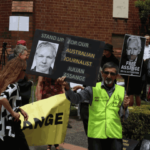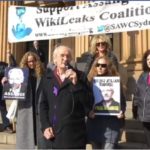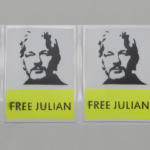SAMS (Special Administrative Measures): A Key Reason Assange Can’t Be Extradited

The treatment the United States metes out to detainees is notoriously harsh, especially if you are considered an enemy of the state, and at times, it plainly constitutes torture.
The extreme abuse at the black site of Abu Ghraib in Iraq and that at the offshore detention centre of Guantánamo Bay in Cuba is testament to how far US authorities are prepared violate international human rights norms. And the US is well versed in applying severities upon domestic inmates too.
The prospect of the harsh US prison regime known as SAMS (special administrative measures) being applied to Julian Assange in the US, along with the Australian journalist’s mental health, led UK District Court Judge Vanessa Baraitser to determine not to extradite him on 4 January 2021.
The UK High Court, however, overturned the decision the following December based on US assurances that included not applying SAMS to Julian. But there is a caveat to that. And since the attention given to his February appeal, it’s been apparent the death penalty is too a prospect.
Right now, two UK High Court judges are considering the case the WikiLeaks founder’s defence team put to them in February, during hearings that may mark his last appeal in Britian. And they will decide if he can reappeal or will be extradited in line with the UK decision to grant this in mid-2022.
And as Australian PM Anthony Albanese has only made shallow attempts to secure the Australian citizen’s release, this shows that his role as US deputy sheriff in the Indo Pacific is one that requires complete subservience, and this week’s AUKUS revelations have only strengthen this understanding.
An ambiguous caveat
The US provided assurances in a diplomatic note marked 5 February 2021. These comprise of not detaining Assange in SAMS or Colorado’s ADX Florence supermax facility, as well as allowing Julian to serve his time in Australia post-conviction, and that he will receive appropriate care in US custody.
The caveat is that the promise to not place Julian in SAMS or ADX Florence, “either pretrial or after any conviction” holds, unless “he commits any future act which renders him liable to such conditions of detention”.
As the decision to overturn Baraitser’s ruling was made, Doctors for Assange warned that the White House can’t be trusted when it comes to Assange, as, by then, it was understood the US indictment contains lies and that the Trump administration plotted to assassinate or kidnap the Australian.
Another point is that the June 2020 US second superseding indictment against Assange involves journalistic actions between 2009 and 2012, and the main WikiLeaks’ US classified publications that he’s being prosecuted over, which were redacted, occurred in 2010 and 2011.
But what became more apparent during last month’s appeal was that the Trump administration determined in 2017 to go after Assange, which Obama had initially decided against, only after WikiLeaks had leaked the CIA’s Vault 7, which revealed the extent of the agency’s hacking abilities.
This saw new CIA director Mike Pompeo condemn WikiLeaks as a “nonstate hostile intelligence service” and he then led the charge to prosecute the Australian on US soil.
The publishing of the 2017 Vault 7 leak obviously didn’t occur as “a future act” in comparison to the 2021 US assurances provided to the UK courts in regard to Assange’s treatment in US detention.
But a question remains as to whether a US attorney could argue that this was “a future act” in comparison to the indictable acts, which occurred half a decade prior, and would a US judge accept this, then triggering the caveat and opening up the prospect of SAMS and ADX Florence for Assange?
Civil death
The law governing SAMS is set out under title 28 chapter V subchapter A part 501.3 of the US Code of Federal Regulations, under the title prevention of acts of violence and terrorism. It outlines that the US attorney general and the Bureau of Prisons director can request a warden apply the regime.
SAMS is to be applied when “there is a substantial risk that a prisoner’s communications or contacts with persons could result in death or serious bodily injury to persons, or substantial damage to property that would entail the risk of death or serious bodily injury to persons”.
The regime can include “housing the inmate in administrative detention and/or limiting certain privileges, including… correspondence, visiting, interviews… and use of the telephone, as is reasonably necessary to protect persons against the risk of acts of violence or terrorism”.
The Federal Bureau of Prisons established SAMS back in 1996, in order to deal with incarcerated people, who pose extraordinary risks to the public from within prison. And since the 2001 9/11 terror attacks in New York, the restrictions included in the regime have been heightened.
Indeed, since early this century, SAMS means the monitoring of lawyer-client communications, as well as being able to be applied to an individual inmate for a year, instead of just 120 days, it’s made it easier to apply SAMS to an prisoner, and it can now be used on remandees.
Former CIA employee Josh Schulte leaked Vault 7 to WikiLeaks. Prior to his being sentenced to 40 years in prison for doing so last month, he was being kept under SAMS in New York’s Metropolitan Correctional Centre, which has a reputation of applying such measures to detainees.
Schulte had to appear in court handcuffed and shackled, he was chained to a bolt in the floor when meeting with his lawyers and when these meetings took place, he couldn’t use the bathroom but had to go in a plastic bag, explained CIA whistleblower John Kiriakou in an article last month.
During his remanding, Schulte was kept “in solitary confinement in a cage in a small concrete box the size of a standard parking space 24 hours a day”, he was allowed two showers a week, and could not use a phone, email, watch television or listen to the radio. And his only visitors were his attorneys.
This is the fate that did await Assange, and likely could still be facing him after extradition. And following on from the toll that’s been taken over the five years spent in prolonged isolation in London’s Belmarsh Prison, it’s well understood that he would not survive such an ordeal.
Destroying the messenger
After the Assange legal team put its arguments to the High Court on 20 February, Australian barrister Jennifer Robinson told WikiLeaks there were concerns being raised about the death penalty being a potential sentencing option in the US.
And she added that this could happen if extra charges regarding other acts were brought that warranted the death penalty, or if the conduct in the indictment, which carries a maximum penalty of up to 175 years prison time, could be used to attract new charges that carry execution.
Julian’s wife Stella Assange called on prime minister Albanese to publicly increase the pressure on the US to release her husband this week.
“‘Enough is enough’: he’s been saying that for three years. You have to bring that up a notch and, of course, he has the backing of the Australian people and the Australian public to say it clearly now” that Julian has to be released,” asserted Stella. “He needs to be released now.”
Stella also told those gathered before the UK High Court on 20 February that the judges had been made aware of the plots to take her husband’s life, as well as those to kidnap him, and they’d also been made aware of Mike Pompeo’s obsession with killing Julian.







